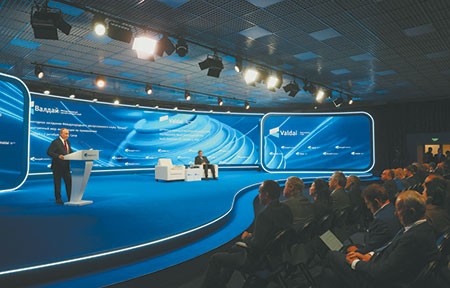The knock-on effects of Putin's speech in Sochi
Faced with the president's increasingly radical stance in his confrontation with Europe, the communists hope to regain a central role in Russian politics, breaking free from the absolute dominance of Putin's United Russia party and competing with the liberal-nationalists of the LDPR party, the ‘right-wing populists’ of national politics.
Moscow (AsiaNews) - Russian President Vladimir Putin's speech at the Valdai International Centre in Sochi on 2 October has been meticulously analysed by many political and social groups in Russia, including the Centre for Research on Russian Political Culture Zipkr, founded in 1989 by the best Soviet political scientists at the end of the regime, and the KPRF Communist Party's department for the organisation of election campaigns.
The communists are convinced that Putin's assessments of foreign policy are set to become increasingly radical, and this development is very popular among them.
Russian left-wing politicians have noted in the presidential speech some hints of possible changes in domestic policy prospects, which could lead to a major “clean-up” of the many bureaucrats who have been sitting in positions of power for too long, and perhaps even of the “fifth columns” that are holding back the realisation of Russia's grand plans.
Zipkr's analysis highlighted a transformation in Putin's geopolitical views in the phrases “from competition to confrontation of principles”, “from ideological illusions to historical lessons” and “from philosophy to pragmatism”.
The change is seen above all in the fact that Putin has always criticised and reproached the West for various reasons, while now he openly accuses it, starting with the European Union, of endangering the stability of the world order. Communists recall many quotes from presidential speeches in past years, which increasingly evolve in this accusatory direction, especially since 2022, when the invasion of Ukraine was justified as “defence against Western aggression”.
Communists and political scientists agree that Putin intended to demonstrate that “Russia is seeking proposals for meeting and dialogue from the West, with increasingly pressing terms, but without radicalising its actions”.
The analysts' conclusions focus on the fact that in this year's speech, Putin intended to “draw conclusions from years of geopolitics, especially following the war, in which the fundamental positions remain stable but evolve from the analytical criticism of 2022 to the rhetoric of mobilisation and Russia's mission in 2024-2025”.
The criticism of the globalist world order is evident, even if the obsolete term “capitalism” is no longer used, replaced in speeches by “neo-liberal globalisation”, “neo-colonialism” and “the liberal order”, instead of the usual ideological concepts condemned in Soviet times.
However, the theme of the collapse of the USSR remains relevant, moving from a simple acknowledgement of the fact as “the greatest tragedy of the 20th century” to a very severe criticism of the “historical mistakes” that led to the current conflicts.
The communists insist on the need to combat the country's “internal traitors”, referring to Putin's criticism of the “bureaucratic caste” that hinders all initiatives and actions, including the strategy of union with China, which is not taking off due to delays in the construction of the “Power of Siberia-2” gas pipeline and other important projects.
Putin's remarks can be interpreted at various levels, not only in relation to the Kremlin leadership, but also with regard to regional officials and many state and social institutions throughout Russia.
The communists hope to regain a central role in Russian politics, breaking out of the absolute dominance of Putin's United Russia party and competing with the liberal-nationalists of the LDPR party, the “right-wing populists” of national politics.
The president's speech confirms the fundamental concept of the “besieged fortress” that must be saved from the “global South-East”. But in trying to open the doors to all the forces willing to enter this fortress, from Trump to the many sympathetic parties in Europe such as Hungary and Slovakia, joined in recent days by Babiš's Czech Republic, not to mention the political crisis in France and the growth of the pro-Putin right-wing AfD in Germany.
21/09/2021 10:32







.png)










